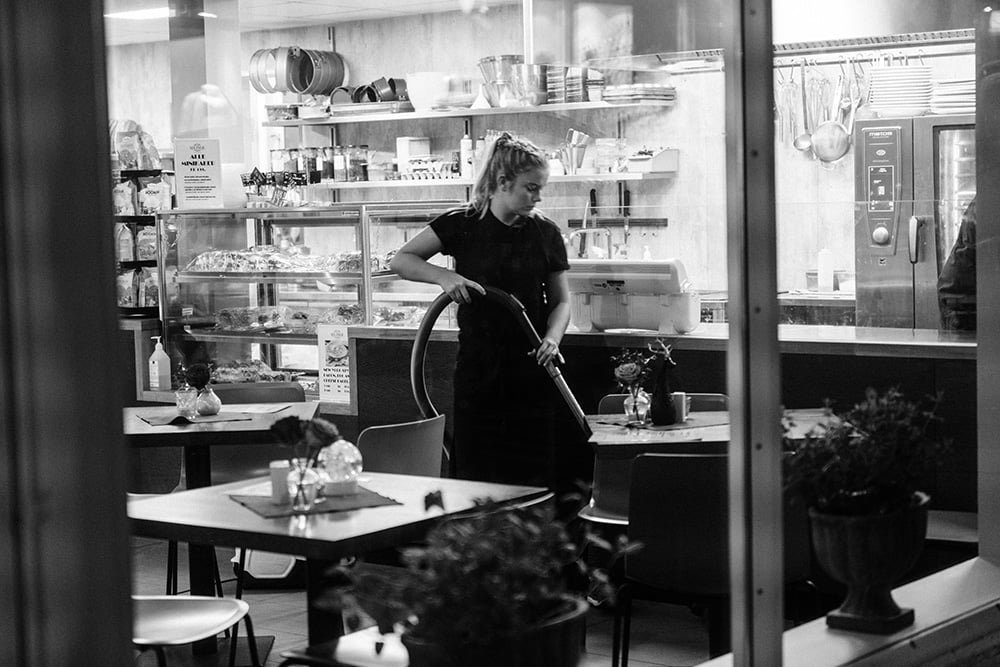Restaurant operators across Canada are struggling to find enough staff to run their operations. This labour crisis has been highly publicized by Canadian media as a “labour shortage.”
A recent survey by Restaurants Canada found that 80 per cent of food service operators were finding it difficult to hire kitchen staff and 67 per cent were having trouble filling serving, bartending and hosting positions.
Prior to the pandemic, Canada’s food service sector employed 1.2 million people and, according to Statistics Canada, it currently needs to fill 130,000 positions to reach pre-pandemic levels.
That said, the Canadian restaurant industry has been struggling with hiring and retention problems for many years.
Should the chronic hiring struggles of Canadian restaurants be referred to as a labour shortage, or can it be more accurately portrayed as a retention issue fuelled by a lack of decent work?
Does the use of the term labour shortage take the onus off of restaurant operators for creating these shortages, and instead place it on Canadian job-seekers?
A 2010 Canadian Restaurant and Foodservices Association report found that 22 per cent of Canadians worked in a restaurant as their first job — the highest of any industry. The study also found that 32 per cent of Canadians have at one point worked in the restaurant industry.
These statistics show that millions of Canadians have been introduced to restaurant work and the industry has enjoyed a seemingly endless supply of labour for decades. So why is it that the restaurant industry is burning through so many people?
Our research on restaurant work conditions shows that working in a restaurant is difficult, requiring the sacrifice of work-life balance due to long hours and unpredictable schedules.
While restaurant work can be rewarding and fun, it can also be low-paying, stressful and physically demanding, all of which can have a negative impact on mental health.
Many restaurant workers spend at least eight hours a day on their feet with no time for breaks or meals. Workers are also required to forego their social and family life by having to work late nights, weekends and holidays.
Many restaurant workers almost never know precisely when their shifts will end, and tend to be placed on unpredictable split shifts or “on call” shifts to save labour costs.
The restaurant industry has also been rampant with sexual harassment, abuse and toxic work environments.
A Statistics Canada study found that hospitality workers have the worst job quality out of any industry. This was largely due to low earnings, the inability to take time off, no paid sick leave, a lack of training opportunities and no supplemental medical and dental care.
This same study found that 67 per cent of hospitality workers work in jobs with work conditions that fall below “decent work” levels.
So what exactly is “decent work?” It’s a concept established by the International Labour Organization and is linked to the United Nation’s Sustainable Development Goals.
Decent work establishes universal conditions of work that are central to the well-being of workers.
These conditions are considered to be minimum labour standards that include living wages, work hours that allow for free time and rest, safe working environments and access to health care.
Decent work is considered a human right, but based on the conditions of restaurant work, it appears the Canadian restaurant industry is struggling to provide it to all of its employees.
Through our research on restaurant work, and via conversations with many restaurant employees across the country, we’ve learned that many are fleeing the industry because the work is a grind. What’s more, they don’t see any future in a job that will continue to hinder their well-being.
The pandemic allowed workers time to find jobs in other industries that provide more stability and feature regular work schedules, vacation time, higher pay and benefits.
These workers often felt neglected, and that their employers did not believe they were worth investing in.
While there are certainly good restaurant employers, the industry as a whole has failed to improve working conditions because historically, there were always new people to fill roles.
That raises the question: Could the continuous reference to a labour shortage in the restaurant industry actually be creating a lack of urgency in addressing longstanding issues of work quality?
If restaurants want to operate at full staff in the post-pandemic future, they need to invest in their employees. It’s impossible to run a restaurant without people working in it.
The restaurant industry has always spent money, time and resources to attract customers and increase revenues. It’s long past time for restaurant operators to consider their employees internal customers and put as much effort into providing great experiences for them as they do for their external customers.
A good place for operators to start is by providing decent and dignified work for all that provides decent wages, benefits and healthy working conditions.![]()
![]()
Read more: Rights + Justice, Labour + Industry
















Tyee Commenting Guidelines
Comments that violate guidelines risk being deleted, and violations may result in a temporary or permanent user ban. Maintain the spirit of good conversation to stay in the discussion.
*Please note The Tyee is not a forum for spreading misinformation about COVID-19, denying its existence or minimizing its risk to public health.
Do:
Do not: